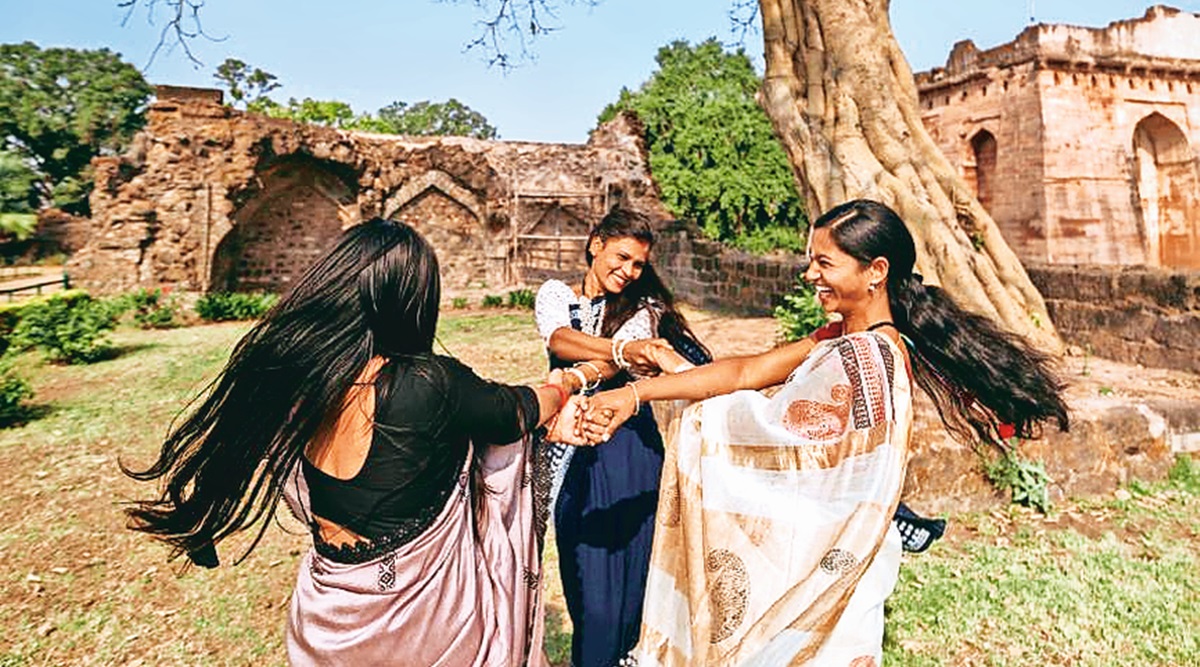 Sita Vasuniya’s photograph on Vogue Italia’s digital edition. (Courtesy: Aditi Gupta)
Sita Vasuniya’s photograph on Vogue Italia’s digital edition. (Courtesy: Aditi Gupta) TILL FIVE days ago, Sita Vasuniya (25) was an unknown tribal woman in the quiet town of Mandu, 35 km from Dhar. But her anonymity ended when her photograph, draped in a beige and golden Maheshwari silk sari which she had hand-printed in bright hues of red and black, got picked up by Vogue Italia’s digital edition on March 29.
Similarly, Kiran Davre (20), from the neighboring village of Sulibardi, was a Microbiology student who also helped out on her family’s one-acre farm. Today, she is considering modelling assignments in Mumbai, after her photographs, in a bright yellow sari handprinted by her, did the rounds of the fashion industry.
Sita and Kiran are part of a group of 10 tribal women who are scripting their own stories of economic and social independence — one sari at a time.
It was only in January that these women, from neighboring villages in Mandu, were roped in for Dhara, a self-help group set up by the district administration to provide sustainable livelihood to women under Madhya Pradesh’s Ek Jila, Ek Utpad Scheme. There are two other such groups — Suraj and Chandani.
Helmed by Dhar’s Additional District Magistrate Saloni Sidana, the group was trained in the traditional handicraft, albeit with a modern twist which included innovation in the texture of fabric, design and colour.
Instead of the conventional ‘Bagh’ design of flower motifs, the district administration tied up with the National Institute of Fashion Technology (NIFT) and Nation Institute of Design (NID) to explore new designs.
Meanwhile, a team of 40, headed by Aman Akash, part of Enactus SRCC, an NGO, conducted a market survey to understand the demands in the textile industry and the ways to reinvent. The team also created a database of prospective clients.
 Women of the self-help group. (Courtesy: Aditi Gupta)
Women of the self-help group. (Courtesy: Aditi Gupta)
“We wanted to create products that appeal to all age groups, and women in different professions who can wear these saris in various seasons. We came up with several designs, playing around with the geometry, and also experimenting with the fabric,” said Sidana.
A local handicraft artist, Gurudutt Kathe, was roped in to train the women. They learnt to print the wooden blocks on delicate fabric, experimenting with various forms — from Batik to Dabu printing. They were also trained in threadwork and hand painting.
But when the first batch of saris were ready, the second wave of Covid-19 made travelling difficult. Aditi Gupta, a Delhi-based photographer, was roped in so that the saris could be displayed in a catalogue instead. And the women modelled their saris themselves.
“They told us to dress as we usually do. We were not made to put on any make-up or anything that was not us,” said Mona Daver, another member of Dhara who has become an expert in Batik printing.
The 10 women were photographed against the picturesque backdrops of historical monuments around Mandu. Gupta later shared these photographs – on a platform for photographers called Photo Vogue on Vogue Italia’s digital edition, and within her circle.
“My father-in-law called me and said ‘meri bahu ne mera naam ucha kar diya hai’,” said Sita, a mother of a two-year-old.
Sitting in her mud house, surrounded by her four sisters, Kiran is weighing her options – whether to continue her studies, or take up the modelling offers. “It is her choice, if she wants to go,” said her father, Kanhaiya.
Meanwhile, the Dhara women have received Rs 3,000 each for their work. For many, it was their first salary. “I wanted to buy a sari, but I thought that if I save the money, I will be able to help my husband to build our house,” said Mona. Sita wanted to buy a cellphone.
The new saris, with their trendy designs, have attracted many homegrown brands in Delhi and Mumbai. Some designers have also sent inquiries, seeking to collaborate and use the printed material for bags and shoes. With many individuals approaching them for single pieces, Dhara has also created an Instagram account to display the saris.
Sidana said they had already received orders for 200 saris. With the new orders, the women in the group are looking at earning at least Rs 10,000 per month. And after the photoshoot, she said, she started getting calls from several tribal women. “Women empowerment is not about holding programmes to mark Women’s Day, but about such small actions of upliftment and providing livelihood. I am glad that their understanding of what constitutes beauty has changed and they can look in the mirror and feel they are as beautiful as anyone else,” said Sidana.
Dhar Collector Alok Singh said he had allocated Rs 5 lakh for the project, which may be expanded to include about 25 women. There are plans to get another Rs 25 lakh from corporates, as part of their CSR funding. “We want to ensure adequate funding so that their business can start rolling; they can later self-finance it,” he said.
- The Indian Express website has been rated GREEN for its credibility and trustworthiness by Newsguard, a global service that rates news sources for their journalistic standards.

